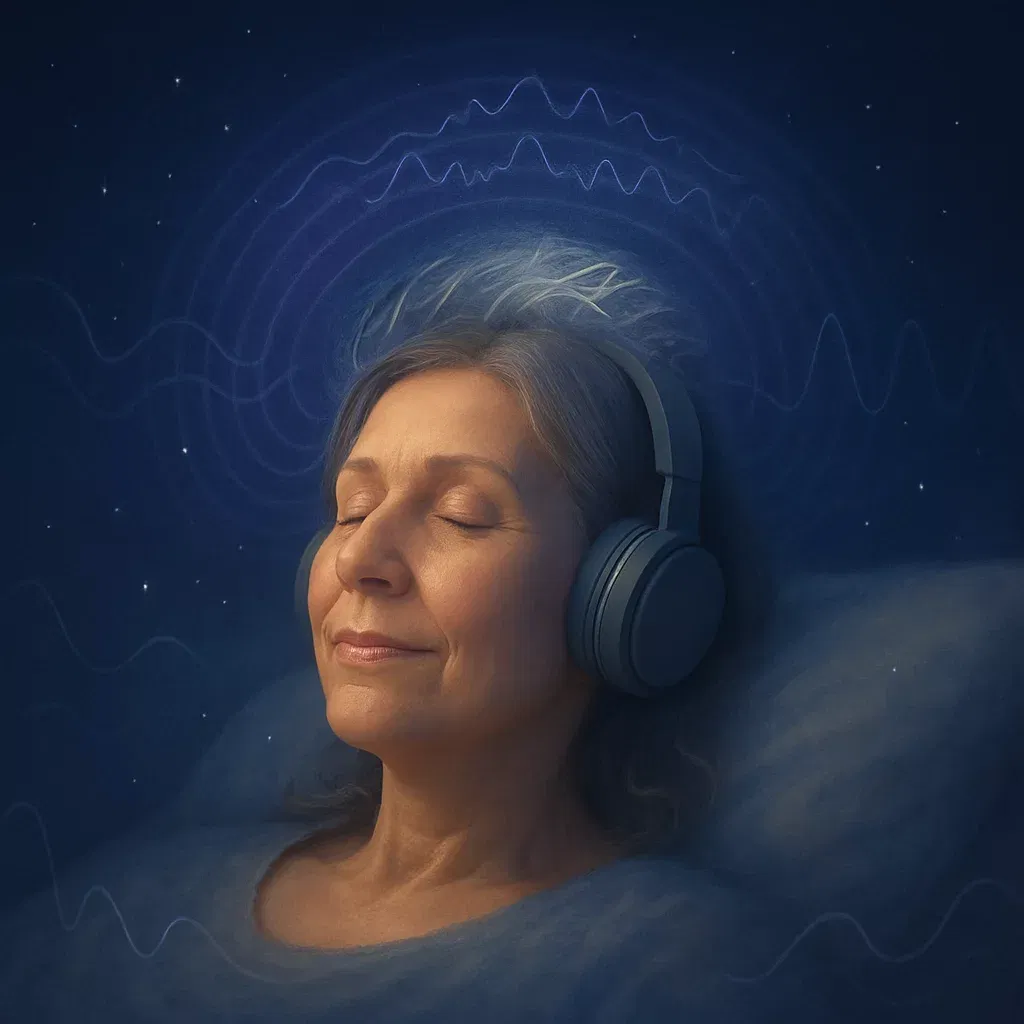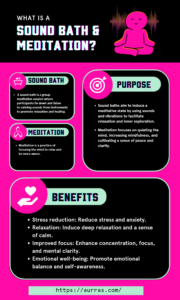Finding serenity and peace is becoming more and more challenging given everything in the world that’s going on. Thus, quality sleep has become a precious commodity. If you’re among the countless individuals struggling with restless nights or insomnia, you’re likely familiar with that frustrating cycle of tossing and turning while your mind refuses to quiet down. The good news? Sound therapy—specifically binaural beats—offers a scientifically-backed approach that could transform your sleep experience. As explored in our article Better Sleep with Vibrational Sound Therapy, the healing power of sound can be particularly effective for those suffering from sleep deprivation.
What Exactly Are Binaural Beats?
Binaural beats aren’t just ordinary sounds—they’re an auditory illusion created when two slightly different frequencies are played separately in each ear. Your brain processes this difference and produces a third tone, which is the binaural beat. For example, if your left ear hears a tone at 200 Hz and your right ear hears one at 210 Hz, your brain creates a binaural beat at 10 Hz.
What makes this phenomenon so powerful is how it affects brainwave activity. Your brain naturally operates at different frequencies throughout the day:
- Beta waves (13-30 Hz): Active, alert mental state
- Alpha waves (8-12 Hz): Relaxed awareness, light meditation
- Theta waves (4-7 Hz): Deep meditation, REM sleep, creativity
- Delta waves (0.5-4 Hz): Deep, dreamless sleep and healing
When binaural beats are played at frequencies matching theta or delta waves, your brain begins to synchronize with these frequencies—a process called entrainment. This gentle guidance helps transition your mind from busy beta waves to the slower rhythms necessary for restorative sleep.
How Binaural Beats Improve Your Sleep Quality
The benefits of using binaural beats for sleep extend beyond just falling asleep faster:
1. Natural Transition to Sleep State
Unlike medication that forces your body into sleep, binaural beats work with your brain’s natural mechanisms. Delta wave binaural beats (0.5-4 Hz) gradually guide your brainwaves toward the frequencies naturally present during deep sleep. This creates a more natural transition into slumber and helps maintain healthy sleep cycles.
2. Reduced Anxiety and Racing Thoughts
One of the most significant barriers to quality sleep is an overactive mind (surprising no one at all). Theta binaural beats (4-7 Hz) help calm mental chatter by inducing a state similar to meditation. This creates mental space that allows worry and stress to dissipate, making it easier to release the day’s concerns.
3. Increased Deep Sleep Duration
Research suggests regular use of delta binaural beats can increase time spent in deep sleep phases. Since deep sleep is when your body performs essential physical repairs and strengthens your immune system, this directly impacts your overall health and daytime energy levels.
4. Consistency in Sleep Patterns
With regular use, binaural beats can help establish more consistent sleep patterns by training your brain to recognize and respond to these frequencies as sleep cues. This conditioning helps reinforce healthy sleep habits over time.
How to Incorporate Binaural Beats Into Your Sleep Routine
Ready to try this effective sleep solution? Here’s how to get started:
- Use quality headphones: Since binaural beats require different frequencies in each ear, headphones are essential for effectiveness.
- Begin with theta waves: If you’re new to binaural beats, start with theta frequencies (4-7 Hz) about 30 minutes before bedtime to help your mind wind down.
- Transition to delta waves: As you get comfortable with the experience, incorporate delta waves (0.5-4 Hz) closer to bedtime to induce deeper sleep.
- Combine with gentle background sounds: Many binaural beat recordings include gentle rain, soft music, or nature sounds to enhance relaxation. Our 10-Min Sound Bath Sleep Frequencies & Theta Binaural Beats for Profound Sleep offers a perfect introduction to this combined approach.
- Create a consistent routine: Use binaural beats at the same time each night to strengthen the association between these sounds and sleep.
- Be patient: While some people experience benefits immediately, it may take a few nights of consistent use to notice significant improvement in your sleep quality.
The Science Behind the Sound
The effectiveness of binaural beats isn’t just anecdotal. Scientific research supports their use for sleep improvement. Studies have shown that binaural beats can significantly reduce anxiety scores and improve sleep quality measurements. The brain’s neuroplasticity allows it to form new patterns in response to repeated stimuli, which is why consistent use yields the best results.
For those interested in the scientific aspects of sound therapy, our article on The Science Behind Sound Healing delves deeper into how various sound frequencies impact our physiology.
Beyond Binaural Beats: A Holistic Approach to Better Sleep
While binaural beats are powerful tools for sleep enhancement, they work best as part of a comprehensive sleep strategy. Consider pairing your binaural beat practice with:
- Sleep hygiene improvements: Maintain a cool, dark, quiet bedroom environment
- Digital sunset: Reduce blue light exposure at least one hour before bed
- Relaxation techniques: Try our 5-Minute Guided Meditation: Profound and Deep Sleep to complement your sound therapy practice
- Consistent sleep schedule: Go to bed and wake up at the same times each day
Common Questions About Binaural Beats for Sleep
Are binaural beats safe?
Yes, binaural beats are non-invasive and generally considered safe for most people. However, individuals with epilepsy or neurological conditions should consult with a healthcare provider before use.
How long should I listen to achieve results?
Start with 15-30 minutes before bedtime. Some recordings are designed to play throughout the night, gradually shifting from theta to delta frequencies as you sleep deeper.
Can I become dependent on binaural beats for sleep?
Unlike sleep medication, binaural beats don’t create chemical dependencies. They simply help train your brain toward healthier sleep patterns that can eventually become self-sustaining.
Will binaural beats work for everyone?
While most people respond positively to binaural beats, individual results may vary. Factors like stress levels, sleep environment, and consistent use all play a role in effectiveness.
Your Journey to Better Sleep Starts Tonight
Sleep difficulties don’t have to be a permanent fixture in your life. By incorporating binaural beats into your evening routine, you’re tapping into your brain’s natural ability to synchronize with healing frequencies.
Ready to transform your sleep experience? Explore our Sound Healing Library for a variety of sleep-focused sound therapy options, or join one of our specialized workshops designed to help you harness the full potential of healing frequencies for restful, rejuvenating sleep.
Remember, quality sleep isn’t a luxury—it’s essential for your physical health, emotional wellbeing, and cognitive function. Take this simple, science-backed step toward the restorative sleep your body and mind deserve.







